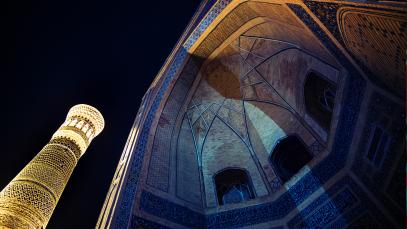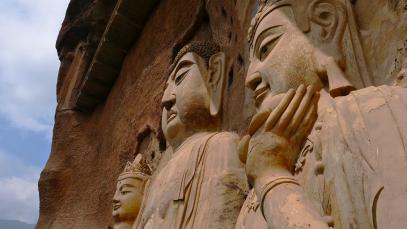Silk Road
Encouraged by renewed interest in the Silk Road - for cultural exchange, trade and tourism - UN Tourism decided to revive the ancient routes as a tourism concept, uniting three continents once more in a project encompassing over 12.000 km
The Silk Road, commonly known as the first global trade route in history, had a scope and importance far greater than the simple exchange of goods. Indeed, the myriad of interconnected routes served as a vehicle for the fruitful exchange of arts, religion, cultures, ideas and technology. Many important developments, in fields ranging from mathematics and philosophy to architecture and gastronomy, were only made possible thanks to the intrepidness of pioneers eager to explore and overcome man-made boundaries and natural determinants.In present time, and building upon a natural and cultural wealth spanning thousands of years, the World Tourism Organization (UN Tourism) is in a position to revive and give a new significance to a route capable of transforming the way we think about and relate to travel. By collaborating in areas of mutual interest, Silk Road Member States and private sector tourism stakeholders are in a unique position to create new opportunities and tourism initiatives capable of favouring sustained and healthy growth.
The concept of a Silk Road tourism project was first raised at UN Tourism's General Assembly in Indonesia in 1993
With initiatives dating back to 1994, UN Tourism was an early advocate of the tourism potential of the Silk Road. Today, 33 Silk Road Member States (Albania, Armenia, Azerbaijan, Bangladesh, Bulgaria, China, Croatia, DPR Korea, Rep. Korea, Egypt, Georgia, Greece, Indonesia, Iran, Iraq, Israel, Italy, Japan, Kazakhstan, Kyrgyzstan, Malaysia, Mongolia, Montenegro, Pakistan, Romania, San Marino, Saudi Arabia, Spain, Syria, Tajikistan, Turkey, Turkmenistan, Ukraine and Uzbekistan (as of February 2018)) from Europe, Africa, Central Asia and Asia & the Pacific, in addition to UN Tourism Affiliate Members from around the globe, work together to promote the Silk Road routes as a transnational tourism adventure.
Together we aim to maximize the benefits of tourism development for local communities, stimulate investment and promote the conservation of the route's natural and cultural heritage by focusing on following areas of work:
To raise the profile of the Silk Road on the international stage, UN Tourism has been collaborating with a wide range of partners, both from the public and private tourism sector.
In recent years, different types of events have been organized – from high-level ministerial meetings such as the 8th UN Tourism International Meeting on Silk Road Tourism in Thessaloniki and our annual Silk Road events at ITB Berlin to capacity building workshops and Task Force Meetings.
Additionally, UN Tourism has worked with important partners such as Pilot Productions, BBC 4 and Discovery Channel UK.
The transition towards a service based economy poses both challenges and opportunities. A signal of economic maturity, it also implies the need to constantly innovate and excel in the deliverance of services, a feat that can only be accomplished by a highly qualified workforce.
Applied to the tourism industry, service excellence implies personal skills, customer service training, knowledge of the tourism product, and know-how in the field of tourism management – all areas in which we can support our Member States.
With experience in developing trainings in many Silk Road countries together with a strong group of UNWTO Affiliate Members and sister organizations such as UNESCO, the scope of activities developed can range from training of tour operators; skills training for heritage guides; the development of international marketing strategies, and marketing workshops.
In terms of route development activities, two main ideas guide our work:
First of all, globalization, urbanization, the rise of new industries, and the spread of English as a global lingua franca have influenced every sphere of life, including tourism. Indeed, the signal effect of these changes is the ever-increasing salience of aspiration as a motivator of our actions and behaviour. As representatives of the tourism sector sufficiently know, “experiential travel”, the search for new experiences and destinations, is a global phenomenon on the rise, from which especially Silk Road destinations, who offer unique and untapped travel opportunities, can benefit from in the years to come.
Secondly, with rich and authentic experiences already in place, we see UNWTO’s role not so much in reinventing available routes from anew, but in boosting best-practice examples already taking place across the Silk Road.
Recently, our route development activities have been focused on developing the Western Silk Road and the Maritime Silk Road.
Primary Silk Road tourism data is scarce or even non-existent, and by collecting information on the interests, needs, expectations, expenditure patterns and satisfaction levels of the international traveller, we aim to gain valuable source information on how to strengthen the Silk Road attributes of participating destinations.
Based on trainings and Visitor Surveys conducted in Uzbekistan and Kazakhstan in 2018, Member States gain important know-how on how to attract and improve services aimed at the international traveller, and how to plan associated tourism infrastructure and facilities, an area ranging from the hospitality industry to tourism products and available tours, in a targeted and cost-effective way.
Task Force
The Silk Road Task Force ensures that all Member States are duly represented and have the opportunity to provide input into the Programme.
The Task Force group is also responsible for:
- Providing timely feedback on UN Tourism Silk Road programme strategies and action plans
- Discuss and endorse the Silk Road Action Plan
- Ensure the coordinated implementation of the Action Plan, including strategies for immediate and longer-term action
- Promote coherent and coordinated messaging and information sharing
- Share and exchange know-how and best practices
Following Member States have nominated a Silk Road Task Force Representative (as of February 2017, enlisted Member States are grouped according to UN Tourism's organizational structure):
Europe: Armenia, Albania, Azerbaijan, Bulgaria, Croatia, Georgia, Greece, Israel, Italy, Kazakhstan, Kyrgyzystan, Montenegro, Romania, San Marino, Spain, Tajikistan, Turkey, Turkmenistan, Ukraine and Uzbekistan.
Asia & The Pacific: Bangladesh, China, Democratic People's Republic of Korea, Indonesia, Japan, Republic of Korea, Malaysia, Mongolia and Pakistan
Middle East: Egypt, Iran, Iraq, Saudi Arabia and Syria.
Silk Road Task Force Meetings:
- 8th UN Tourism Silk Road Task Force meeting - Kayseri, Turkey (April 2018)
- 7th UN Tourism Silk Road Task Force meeting - Valencia, Spain (March 2017)
- 6th UN Tourism Silk Road Task Force meeting - Urmia, Islamic Republic of Iran (April 2016)
- 5th UN Tourism Silk Road Task Force Meeting - Seoul, Republic of Korea (April 2015)
- 4th UN Tourism Silk Road Task Force Meeting - Tbilisi, Georgia (July 2014)
- 3rd UN Tourism Silk Road Task Force Meeting - Baku, Azerbaijan (April 2013)
- 2nd UN Tourism Silk Road Task Force Meeting - WTM London 2012
- 1st UN Tourism Silk Road Task Force Meeting - WTM London 2011




